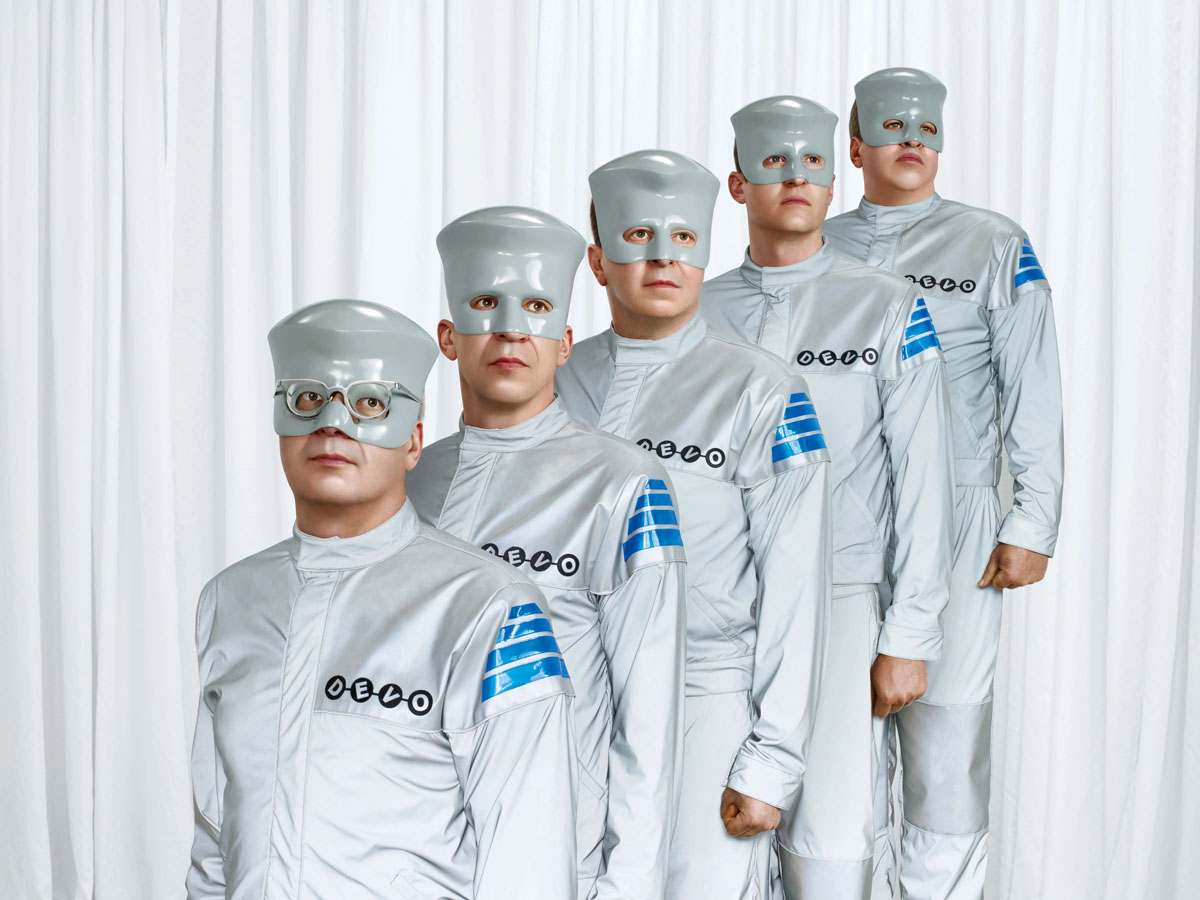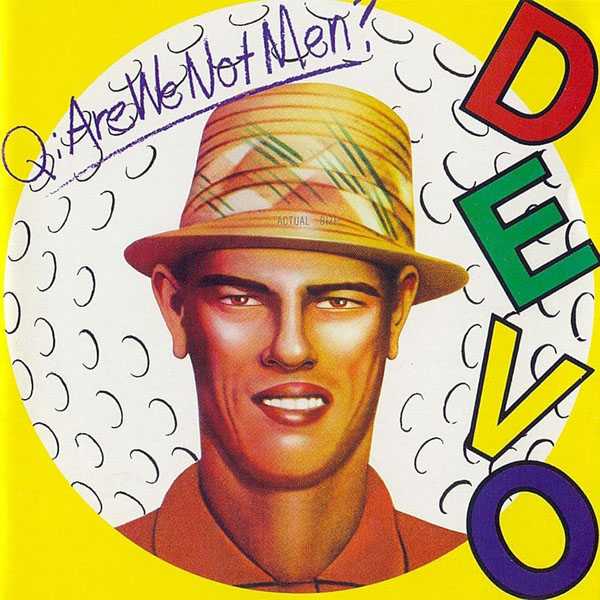Devo Turns 50. Hear Their Previously Unreleased 1987 Interview
Podcast: Play in new window | Download
Subscribe: RSS
 They haven’t recorded anything new in over a decade, and nothing for twenty years before that. Their most consequential body of work was at the turn of the 1980s where they presaged New Wave music. But Devo remains a singularly unique entity. There is no one like them and their influence has been broad and deep . Their music is laced with irony and social commentary, married to a mechanized music aesthetic and a dadaesque visual aesthetic. Emerging out of Kent State University in Ohio, they found their identity after the massacre there in May of 1970. By the time of their debut single they had already produced several videos and the film, The Truth About De-Evolution. But it was the single “Mongoloid” b/w “Jocko Homo,” released in 1977, that put them on the music map. I remember picking that up at 3rd Street Jazz & Rock in Philadelphia and playing it on the progressive music show, Diaspar on WXPN Philadelphia. It definitely sounded different. Although they emerged out of the punk scene, they were not remotely punk, recalling The Residents more than any other band out there. I saw them at the Hot Club in Philadelphia on their first tour. No one looked like them on stage, with their hazmat
They haven’t recorded anything new in over a decade, and nothing for twenty years before that. Their most consequential body of work was at the turn of the 1980s where they presaged New Wave music. But Devo remains a singularly unique entity. There is no one like them and their influence has been broad and deep . Their music is laced with irony and social commentary, married to a mechanized music aesthetic and a dadaesque visual aesthetic. Emerging out of Kent State University in Ohio, they found their identity after the massacre there in May of 1970. By the time of their debut single they had already produced several videos and the film, The Truth About De-Evolution. But it was the single “Mongoloid” b/w “Jocko Homo,” released in 1977, that put them on the music map. I remember picking that up at 3rd Street Jazz & Rock in Philadelphia and playing it on the progressive music show, Diaspar on WXPN Philadelphia. It definitely sounded different. Although they emerged out of the punk scene, they were not remotely punk, recalling The Residents more than any other band out there. I saw them at the Hot Club in Philadelphia on their first tour. No one looked like them on stage, with their hazmat  suits, playing guitars, drums and an Electrocomp 500 synthesizer, and jerkily moving to their syncopated grooves. Along with bands like Ultravox and Magazine, they were New Wave before New Wave. Their sound became more electronic over the years, especially for their hit single, “Whip It” in 1980. That track is something of a lodestone as it locked in the band’s identity with audiences as a novelty act, ignoring that Devo was actually a subversive conceptual art project based in social criticism, and they’ve been recognized as such by critics and journalists. But they’re also really funny. Why else would Brian Eno produce their debut album Q:Are We Not Men? A: We Are Devo.
suits, playing guitars, drums and an Electrocomp 500 synthesizer, and jerkily moving to their syncopated grooves. Along with bands like Ultravox and Magazine, they were New Wave before New Wave. Their sound became more electronic over the years, especially for their hit single, “Whip It” in 1980. That track is something of a lodestone as it locked in the band’s identity with audiences as a novelty act, ignoring that Devo was actually a subversive conceptual art project based in social criticism, and they’ve been recognized as such by critics and journalists. But they’re also really funny. Why else would Brian Eno produce their debut album Q:Are We Not Men? A: We Are Devo.
Besides their nine studio albums, as individuals they’ve done several music videos, as well as film and television soundtracks, including Mark Mothersbaugh’s scores for Rugrats, The Royal Tannenbaums and most famously, Pee-Wee’s Playhouse. The band are currently touring the world and have released a retrospective, 50 Years of De-Evolution 1973-2023.
I interviewed the band in 1987. For some reason, it was never used in the Totally Wired radio show I produced at the time, nor did I use it in print, even though in the interview I said it was going to be in Electronic Musician Magazine, which I wrote for in the 1980s and 90s. I talked to Mark Mothersbaugh and Jerry Casale in a warehouse-like space in Los Angeles. Late into the interview Bob Casale, who sadly passed in 2014, entered the conversation. It was pretty noisy and some woman kept making announcements on a PA. It was a long way from Mutato Muzika, their high-end studio in West Hollywood where I talked to Mothersbaugh again in the early 2000s. They were sort of in-between at this moment sitting between . They’d been dropped by Warner Bros and their last album on the label, Shout came out in 1984, and their next one on Enigma, Total Devo, was released in 1988. It’s a rambling interview and pretty funny.
